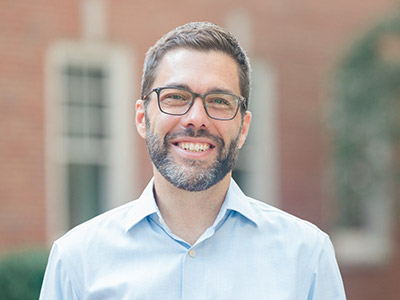Approaching Mission and Discipleship Relationally
For some, the call to ministry is a slow pull that builds over years. For others, like associate professor of missiology Dr. Scott Hagley, it’s like jumping into the deep end of a pool for the first time.
Scott’s plunge came during college, when he was tasked with teaming up with a fellow first-year student to launch a brand new ministry at a local high school. The two began hanging out in the high school cafeteria and attending the school’s sports games. Soon they were leading a large weekly gathering of high schoolers. The zero-to-60 ministry journey continued when Scott spent a summer playing soccer in Vancouver as part of a sports ministry. While there, he became deeply involved in a new missional church plant focused on starting home church groups in a working class neighborhood.
As the dust settled from Scott’s college ministry experiences, two passions emerged that have shaped the trajectory of his career to this day.
In the high school ministry, he became convinced that mission and discipleship must be approached relationally, through shared life.
At the church plant, he found a community in which he could wrestle with the Western church’s problematic relationships with capitalism, militarism, and affluent suburban culture.
A few years later, Scott moved back to Vancouver to attend seminary and to serve as the youth pastor, and then later as a teaching pastor, for that same church plant. There he discovered one of his core convictions about theological education: it should form people in community that can help integrate the classroom, every day ministry, vocational discernment, and spiritual formation. This key insight came when he realized he was being formed by the synergy created between his coursework, ministry position, and “intern dinners” he had each week with other young leaders in his church.
In 2015, after obtaining his doctorate, Scott arrived at Pittsburgh Theological Seminary. Scott wears many hats at the Seminary, and each one connects to his pivotal experiences in high school ministry, church planting, and intern dinners. In addition to teaching, Scott is the faculty liaison for the World Mission Initiative and the faculty mentor for both the DMin Missional Leadership focus and the Graduate Certificate in Adaptive and Innovative Ministry.
In all these roles, Scott is grateful to help form ministers in ways that reflect his own experience and work: through relational cohorts of mutual learning that build bridges between the academy and the parish. His service at PTS is marked by attentiveness to the creative work being done in the margins of our church systems.
This semester, Scott is teaching a class called Capitalism and Christian Witness, which explores the consequences of U.S. capitalism for church mission and ministry. This topic is one that Scott himself has been wrestling with since his first days of ministry in college—and we are grateful that he continues this important work in Pittsburgh.

